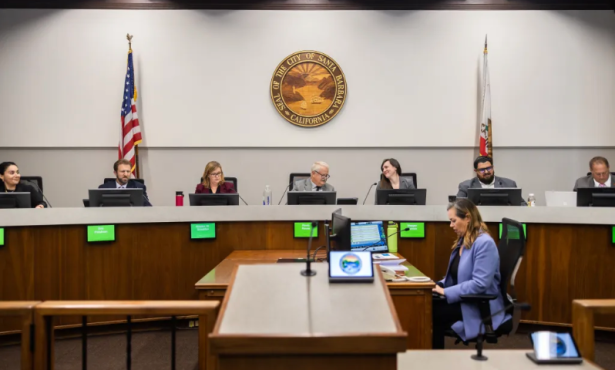Hewing and Hacking
City Budget Deliberations Get Underway
There was no talk about rending of flesh, but plenty of verbiage devoted to the hacking and hewing of limbs Monday night, as the Santa Barbara City Council presided over a five-hour long public hearing on proposed budget cuts to the city’s library system and to its Parks and Recreation Department. It was the first of several such hearings the council will hold between now and June 23, when a final budget is scheduled for adoption. On the table are $10.5 million in budget “adjustments” citywide, which includes more than $7 million in actual cuts. The library department is slated for half-a- million dollars in cuts, while Parks and Recreation is eyeballing a funding reduction of $1.5 million. “It’s very painful to watch [Library Director] Irene [Macias] figure out which leg, which arm to whack off,” said Friends of the Library president Jeri Moulder.
“Well, the carnage begins,” said councilmember Das Williams, before exhorting his council colleagues and city administrators to keep an open mind and keen eye out for raising new revenues. “We need to have more than a ‘not cut-your-arm-off’ strategy,” he said. For example, Williams suggested that City Hall impose a new tax on medicinal marijuana sales as well a new 25-cent tax on retail customers who do not bring their own shopping bags.

In that same vein, councilmember Grant House wondered why the library department – which is proposing to shut down operations every Monday and axe its director of youth programming – did not have a development director on staff whose job it was to fund money. House was equally pointed in his praise for Parks and Recreation chief Nancy Rapp, who suggested creating a whole new bureau dedicated almost exclusively to fundraising. Rapp also unveiled new plans to fundamentally re-organize her department, merging many youth programs with community services. Such bureaucratic re-organization was much on the mind of councilmember Iya Falcone, who suggested that the city’s current budget crisis also provided an opportunity to embrace new and better ways of delivering services. Echoing some of the early rhetoric of Governor Arnold Schwarzenegger – who pledged to “blow up the boxes” of state government – Falcone said, “We have some opportunity to blow up some old systems.”
Though the meeting went past 10 p.m., the council chambers remained well populated late into the night as large numbers of teens stayed to vent their concerns about Rapps’s plans to “re-organize” how youth services are provided. The new notion – which has yet to be thoroughly fleshed out – plans to fuse the delivery of youth programs with other neighborhood services usually delivered via the city’s many community centers. Many teens and their supporters expressed concern that youth programs could easily get lost in the new shuffle, especially those targeting at-risk kids. Many also expressed unhappiness that the Teen Center, located on 1235 Chapala Street, will be closed on Saturdays as a result of the budget cuts. And even more, they were unhappy that the budget axe was falling on an especially popular and effective supervisor of youth programs. Almost equally unhappy were a vocal contingent of swimmers, upset by plans to eliminate adult lap swimming at Los Banos Pool on Sunday afternoons. Thus far, they claim to have amassed more than 200 signatures in opposition.
Despite the grimness of the enterprise, there were moments of levity. While discussing the library budget, Mayor Marty Blum asked Library director Macias about the new language used to describe overdue book fines, which have declined in recent years. “By the way, when did we change from ‘overdue fine’ to ‘extended use fee?” Blum asked. “We did that to reduce the stigma of overdue users,” Macias responded. “People need to feel the shame,” objected councilmember Williams, who confessed to being a repeat offender when it came to overdue books. So, too, was councilmember House, who revealed that he’d kept a copy of “Winnie the Pooh” for 30 years. “Maybe you needed it for 30 years,” shot back Mayor Blum. There is little playfulness to the numbers behind the banter. The library is projecting a 21 percent cut in what it spends on new titles; service will be slower – given the existing waiting list, one 87-year-old library patron hoping to reserve a popular best-seller has discovered she will have a 14-year wait. In addition, the supervisor of teen outreach programs will be replaced by someone she has trained. The bookmobile service has proven to be an expensive flop, prompting Blum to suggest selling it off. Given that the bookmobile cost $300,000, the mayor reckoned, perhaps its sale could offset some of the painful cuts.
Behind the Power Point presentations and public testimony, it became evident that a power struggle is looming over the extent to which the Waterfront Department – and the downtown parking district – should be charged for maintenance services now provided at subsidized rates by Parks and Recreation workers. Under the proposed budget, Parks and Rec will charge the Waterfront Department nearly $200,000 for cleaning the waterfront restrooms and tidying up the city’s beaches. Two members of the city’s Harbor Commission have already initiated a spirited protest, reportedly gathering petition signatures. They are objecting the Waterfront be forced to increase the slip fees it charges oat owners to generate the extra funds. Councilmember Williams insisted without this “cost shift,” the Parks and Rec Department would be forced to make even more draconian cuts. Councilmember Iya Falcone, however, countered that the Waterfront should only have to shoulder a portion of these costs. She suggested that the beach clean up costs should be passed on to the Creeks Division of Parks and Recreation. The Creeks division is funded by a bed tax surcharge approved by city voters eight years ago to keep the city’s waterfront free from e-coli and other bacterial scourges from the voters. Falcone acknowledged hers is a novel interpretation of what the voters approved, but said, “It’s worth having this conversation.”



